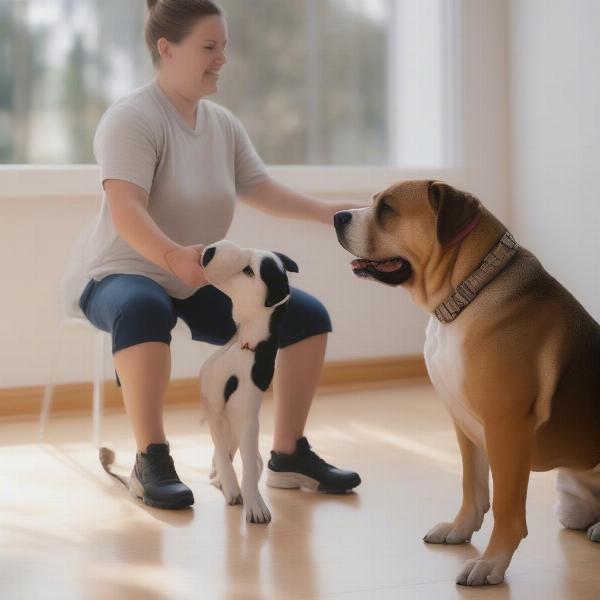The term “bully dog big” often refers to larger bully breeds like the American Bully XL, or larger variations of breeds like the American Bulldog or Olde English Bulldogge. Owning a big bully breed is a rewarding experience, but it’s crucial to understand their specific needs to ensure their health, happiness, and well-being. This comprehensive guide will cover everything you need to know about caring for a big bully breed, from selecting the right breed to addressing their unique health considerations.
Choosing the Right Big Bully Breed
When considering a big bully breed, research is paramount. Each breed, even within the “bully” category, has its own temperament, energy level, and potential health concerns. For example, an American Bully XL might have a more laid-back personality compared to a larger American Bulldog. Understanding these nuances will help you choose a dog that fits your lifestyle and experience level.
Health and Medical Care for Big Bully Dogs
Big bully breeds are prone to certain health issues, including hip and elbow dysplasia, breathing difficulties (especially in brachycephalic breeds), and skin allergies. Regular veterinary check-ups are essential for early diagnosis and treatment. Discuss breed-specific health concerns with your vet to develop a preventative care plan that includes appropriate vaccinations, parasite control, and routine screenings.
Training and Behavior: Raising a Well-Adjusted Big Bully
 Training and Big Bully Dogs
Training and Big Bully Dogs
Early socialization and consistent training are crucial for big bully breeds. Their size and strength necessitate proper manners and obedience. Enroll in puppy classes and continue with ongoing training throughout their life. Positive reinforcement methods work best, focusing on rewarding desired behaviors rather than punishment.
Nutrition and Feeding: Fueling a Big Bully’s Body
Big bully breeds require a diet that supports their large frame and active lifestyle. Choose high-quality dog food formulated for large breeds, ensuring it provides adequate protein, healthy fats, and essential nutrients. Portion control is vital to prevent obesity, a common issue in these breeds. Consult with your vet or a certified canine nutritionist to determine the optimal feeding schedule and portion sizes for your dog’s age, weight, and activity level. bully sticks for big dogs can also be a great treat.
Exercise and Enrichment for Big Bullies
plaque off dogs are a good option for dental health. Daily exercise is essential for the physical and mental well-being of big bully breeds. Provide ample opportunities for walks, playtime, and engaging activities that challenge them both physically and mentally. Puzzle toys, interactive games, and even training sessions can provide mental stimulation and prevent boredom. big bully sticks for dogs are good for helping with this as well.
Grooming and Hygiene: Keeping Your Big Bully Clean and Comfortable
Regular grooming is essential for maintaining a big bully’s coat and skin health. Brush their coat regularly to remove loose hair and prevent matting. Bathe them as needed, using a gentle dog shampoo. Pay attention to their ears and nails, cleaning them regularly to prevent infections.
“Regular brushing and nail trimming are crucial, not just for aesthetics, but also for preventing painful infections and discomfort,” says Dr. Amelia Shepherd, DVM, specializing in canine health and wellness.
Big Bully Puppies: Special Considerations
Puppies of big bully breeds require special care and attention during their formative months. Focus on socialization, house training, and establishing a positive routine. Ensure they receive proper nutrition for growth and development, and avoid over-exercising their developing joints.
Senior Big Bullies: Providing Comfort and Care
long lasting natural dog chews can be a good option for senior dogs. As big bully breeds age, they may require adjustments to their diet, exercise routine, and overall care. Senior dogs are more prone to joint issues and other health problems, so regular veterinary check-ups become even more important. Provide them with a comfortable environment and adapt their activities to suit their changing needs.
“Senior bullies often benefit from joint supplements and adapted exercise routines to maintain their mobility and comfort,” advises Dr. Shepherd.
Conclusion
Owning a “bully dog big” brings immense joy, but responsible ownership requires understanding their specific needs. By providing proper care, training, nutrition, and a loving environment, you can ensure your big bully lives a long, healthy, and fulfilling life. Remember to consult with your veterinarian regularly for personalized guidance and to address any health concerns promptly.
FAQ
- Are big bully breeds good with children? With proper socialization and training, many big bully breeds can be gentle and loving with children. However, supervision is always essential.
- How much exercise does a big bully dog need? Big bullies require daily exercise, typically at least an hour of walks and playtime.
- What kind of food is best for a big bully breed? High-quality dog food formulated for large breeds is ideal, providing the necessary nutrients for their size and activity level.
- Are big bully breeds prone to any specific health problems? Yes, they can be prone to hip dysplasia, elbow dysplasia, breathing problems (in brachycephalic breeds), and skin allergies.
- How do I train a big bully breed? Positive reinforcement methods are most effective, focusing on rewarding good behavior.
- What is the lifespan of a big bully breed? The lifespan varies depending on the specific breed and individual health, but it generally ranges from 8 to 12 years.
- Are big bully breeds good apartment dogs? While some big bullies can adapt to apartment living, they generally thrive in homes with more space and access to a yard.
Related Articles on ILM Dog
About ILM Dog: ILM Dog is your premier resource for expert advice on dog breeds, health, training, nutrition, grooming, and much more. We’re dedicated to providing dog owners worldwide with reliable information to help them give their canine companions the best possible care. From breed selection guidance to health tips and product recommendations, we’ve got you covered. For any inquiries, contact us via email at [email protected] or call us at +44 20-3965-8624.